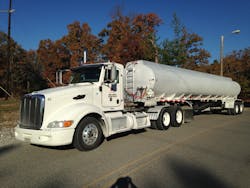The Light Duty article in Fleet Maintenance’s October issue, Fueled to succeed, provided some fleets’ experiences with alternative fuel.
After reading that article, Jerry Wilson, CRL (Certified Reliability Leader), manager of fleet operations, Legacy Regional Transport, Batesville, Ark., contacted us to share his company's experience with biodiesel.
“We originally started using biodiesel in 2008, largely due to interest in alternatives to petroleum,” he says. “We had all of the problems related to biodiesel that are widely known, but we were able to overcome them through training, best practices and using quality biodiesel.
“However, that isn't the point I want to share,” Wilson notes. “Much to our surprise, we have seen an extraordinary improvement in engine life and reliability.”
Legacy Regional Transport has eight trucks that were purchased new in 2008. All are at or exceeding one million miles and “we have not had any engine issues," he says. "We have never had to make any engine repairs outside of turbo or EGR (exhaust gas recirculation) issues.
“We have adjusted valve clearances a couple of times on each of the engines and meticulously maintained them with routine preventive maintenance. We have not seen any signs from any of the engines needing a rebuild (no loss of power and no abnormal oil consumption), and we have never had to replace an injector.”
The company’s fleet of 30 trucks, since 2008, has always been fueled with biodiesel blended fuel. In 2012, it started using distilled biodiesel, “which is a much higher quality fuel,” says Wilson. “All of the other trucks in my fleet have had the same engine reliability results using biodiesel blended fuel.”
About the Author

